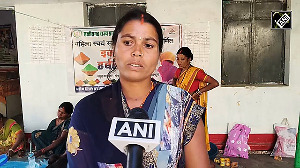In February 2003, the Centre for Science and Environment on pesticide residues in bottled water being sold in the market.
We reported how we found legalised pesticides in bottled water. In other words, the norms for regulating pesticide levels in these bottles were so designed that pesticide residues would not be detected.
We had no intentions of following up this study with investigations in other products. Then people wrote to us from across the country.
| |||||||||||
They wanted to know: if what we had to say about the bottled water industry was correct, then what about soft drink manufacturers? After all, they all used water as a raw material. They also sourced their water largely from groundwater.
We had, they said, a responsibility to tell.
By May, it was also evident that government was prevaricating on legislating the amended, stringent norms for bottled water.
Industry pressure, we were told by wags, was enormous. Stakes were high.
Most of the big players in the bottled water industry, we knew, had the capability to treat and clean the water. They also catered to hapless consumers with little choice but to pay more for water, than for milk. Municipal supplies were unreliable.
Theirs was a thriving business. Nothing, not even a little pesticide, would hold it back. Then why the opposition?
Could it be that the stakes were even higher than we had imagined?
Suppose, what was really at stake was not the bottled water industry and its Rs 1,000-crore (Rs 10 billion) business, but the soft drink industry and its estimated Rs 6,000 to Rs 7,000 crore (Rs 70 billion) business. Indians drink on an average 6.6 billion bottles of soft drinks each year and business is flourishing.
We were surprised by what we found. All bottles of soft drinks analysed at the Centre's pollution monitoring laboratory had pesticides, in much higher quantities than considered safe for humans.
The sum of all pesticides in the PepsiCo Company brands added up to 0.0180 mg/l, 36 times higher than the European Commission's (EC's) limit for total pesticides. Coca-Cola Company had 0.0150 mg/l of all pesticides, 30 times more than the same EC limit.
Even more startling, we found that this human health-impacting industry is more or less unregulated. The Bureau of Indian Standards had, at least, some kind of mandatory standards for the bottled water industry.
In comparison, nothing exists for this "food" industry. It is regulated under a plethora of agencies and standards but most are meaningless or plain ridiculous.
It gets licensed under the Food Products Order and further regulated under the Prevention of Food Adulteration Act, 1954.
The BIS standards, set for it roughly 10 years ago, are voluntary. In other words, this massive industry has been massively let off.
Worse, none of the pieces of legislation even mention the fact that raw water -- over 90 per cent of the finished product -- needs scrutiny.
The limit for deadly arsenic and lead in soft drinks has been set 50 times higher than the allowed standards for bottled water or drinking water. Did the regulators just forget these facts?
Let us be clear, this is not a case involving little companies struggling to make ends meet, that regulators know cannot be regulated.
This involves only two large companies, which incidentally also control the world markets. More importantly, this involves an industry that is a food industry. It impacts our health. Directly.
But there are even bigger stakes at hand. The issues of pesticides in soft drinks and bottled water have brought us some predictable responses. Industry has argued that it is unfair to ask for stringent regulation on pesticides.
We cannot afford it, and these norms are unnecessary because the pesticide residues found are in such small quantities that they are harmless.
But pesticides are deadly in small quantities. They accumulate over time in our bodies.
Increasing evidence shows that some pesticides -- such as chlorpyrifos, a popular insecticide in India -- are deadly even if the exposure is tiny.
Therefore, pesticide, not bottled water or soft drinks, is the point. It is imperative to have a policy for safe use of pesticides.
It is clear that once our soil, food and water is contaminated, it will be prohibitively expensive to clean. We have no choice but to work on the basis of the precautionary principle.
For this we need seriously stringent regulations, to curtail use and to work towards new strategies for "safe" substances.
We cannot afford to clean up after the poisoning. We have no antidote. Whatever the industry and government may believe.





 © 2025
© 2025